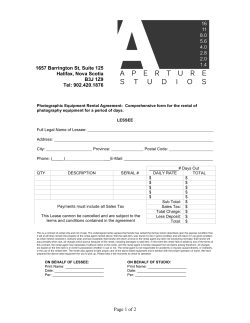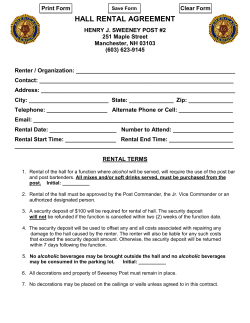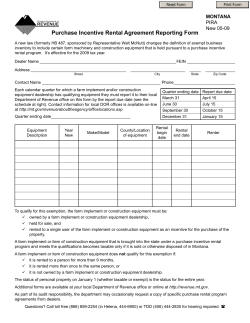
How to Apply Rental Restriction Bylaws Instruction Guide 15
Instruction Guide 15 How to Apply Rental Restriction Bylaws Caution and Disclaimer: Please note that this Guide has not been updated to take into account legislative amendments and court decisions that have occurred since it was prepared in 2000. For example, certain legislative amendments came into force on January 1, 2010 and the Guides have not been updated to reflect those amendments. The reader should review the current legislation or seek professional advice in order to obtain a full understanding of the current provisions of the Strata Property Act. Neither the Superintendent of Real Estate, nor any other authority of the government of the Province of British Columbia, is liable for any inaccurate or incomplete information in this Guide. Important Notice: This Instruction Guide has been prepared by the Superintendent of Real Estate to provide information about the Strata Property Act (the “Act”). This is only a guide to certain parts of the Act and Regulations. Please consult the Act and Regulations to determine the complete and precise requirements of the Act and Regulations. In addition, please remember when reviewing statements about the Standard Bylaws that they may not apply until January 1, 2002, and even when they do apply, they may have been amended or removed if the strata corporation has filed bylaw amendments in the Land Title Office. Please check all filed bylaw amendments to determine whether and how the Standard Bylaws may have been amended. October, 2000. 1. What is a Rental Restriction Bylaw A rental restriction bylaw can: prohibit the rental of residential strata lots entirely; limit the number of strata lots that may be rented; or limit the length of time the strata lots may be rented. A bylaw that limits the number of strata lots that can be rented must also set out the procedure to be followed in administering the limit. A strata corporation that has a bylaw limiting the number of strata lots that may be rented may wish to consider whether the following rentals permitted under other sections of the Act should be counted in the limit: rentals to family members under the family member exception; rentals permitted on the basis of hardship; 15.1 • rentals permitted under a Rental Disclosure Statement; and • rentals established prior to the filing of a rental restriction bylaw in the Land Title Office and permitted to continue under the provisions which delay the application of a rental restriction bylaw. The strata corporation cannot: 2. • screen tenants; • establish screening criteria; • require that it approve of tenants; and • require the insertion of terms in tenancy agreements or otherwise restrict the rental of a strata lot except by a bylaw that prohibits or limits the rental of residential strata lots. Rentals Permitted Under other Sections of the Act If a strata corporation has a rental restriction bylaw, an owner may be permitted to rent his or her strata lot despite the bylaw under the following provisions: 3. • the family member exception; • a determination of hardship by the strata council; • the provision which delays the application of a rental restriction bylaw; and • the owner is a party whose right to rent is preserved by a Rental Disclosure Statement filed by the Owner Developer. Exception for Family Member A rental restriction bylaw does not apply to prevent the rental of a strata lot to a family member. A family member is defined as: • a spouse of the owner; • a parent or child of the owner; or • a parent or child of the spouse of the owner. A “spouse of the owner” includes an individual who has lived and cohabited with the owner for a period of at least two years at the relevant time, in a marriage-like relationship including a marriage-like relationship between persons of the same gender. 15.2 A rental to a family member creates an assignment of the owner’s powers and duties under the Act, Regulations, bylaws, and rules. [For more information on rentals to family members, please refer to Instruction Guide 6, “The Role and Responsibilities of Tenants and Landlords”.] 4. Exemption for Hardship An owner may apply to the strata corporation for an exemption from a rental restriction bylaw on the grounds that the bylaw causes hardship to the owner. Neither the Act nor the Regulations define “hardship”. An application for the exemption must: • be made in writing; • state the reason why the owner thinks an exemption should be made; and • indicate whether the owner wishes a hearing. The Regulations provide that a “hearing” means “an opportunity to be heard in person at a council meeting”. When a hardship application has been made, the strata council must: • hear the owner or owner’s agent within three weeks of the date of the application, if the owner requests a hearing; • give its decision in writing to the owner within one week of the hearing; • give its decision in writing within two weeks after the owner applied for the exemption if no hearing is held or requested. If the strata council fails to provide its decision within the time specified, the exemption is allowed, and the owner would be permitted to rent the strata lot. 5. Provision Delaying the Application of Rental Restriction Bylaws The Act contains a provision that delays the application of a rental restriction bylaw to a strata lot to which the rental restriction bylaw would otherwise apply. Under the delayed application provision, a rental restriction bylaw would not apply to a strata lot until the later of: • one year after a tenant who is occupying the strata lot at the time the bylaw is passed ceases to occupy it as a tenant; and • one year after the bylaw is passed. 15.3 [See Appendix 3 for a flow-chart setting out how rental restriction bylaws are delayed.] 6. Rental Disclosure Statements Under the Act, Owner Developers must provide prospective purchasers with a “Rental Disclosure Statement” (Form J) which has been filed with the Superintendent of Real Estate, if the Owner Developer intends to rent or preserve the right to rent any of the residential units. The Form J: • describes the strata lots which may be rented; and • sets out the date during which the rentals may occur. The effect of the Form J is to preserve the right to rent the strata lot for the length of time set out in the Form J regardless whether a rental restriction bylaw has been passed for: • the Owner Developer; • the first purchaser from the Owner Developer. The right to continue to rent a strata lot despite a rental restriction bylaw is not preserved for a subsequent purchaser who buys the strata lot from someone other than the Owner Developer even though the time period in the Form J has not expired. A purchaser who buys the strata lot from someone other than the Owner Developer does not have a right to rent the strata lot. In such circumstances, the strata lot may only be rented by a subsequent purchaser if: • there is no rental restriction bylaw; • the owner is permitted to rent despite a rental restriction bylaw on the basis of: Ø the family member exception; Ø a determination of hardship by a strata council; Ø the provision which delays the application of a rental restriction bylaw. [See Appendix 1 for a flow-chart setting out how to apply the Form J.] 7. Rental Disclosure Statements (“RDS”) Filed Under the Condominium Act A purchaser may have a right to rent his or her strata lot despite a rental restriction bylaw under the terms of an RDS filed under the Condominium Act. 15.4 The Act clarifies that only the first purchaser can continue renting despite a rental restriction bylaw, if the period of time provided in the RDS during which rentals could occur has not expired. There was ambiguity under the Condominium Act whether only the first purchaser could continue to rent under the RDS despite a rental restriction bylaw. Therefore, a transitional provision is provided to give owners that did not purchase directly from the owner developer an extended period of time before a rental restriction bylaw will apply. 8. Transition Provisions for Rental Disclosure Statements Filed Under the Condominium Act If an Owner Developer filed the RDS under the Condominium Act: • first purchasers are permitted to rent the strata lot even though a rental restriction bylaw is passed until: Ø the rental period in the RDS expires; or Ø the first purchaser sells the strata lot. • subsequent purchasers who did not purchaser from the Owner Developer will be subject to a rental restriction bylaw on the earlier of: Ø the expiry date; or Ø January 1, 2006. • once the strata lot is subject to a rental restriction bylaw the owner may be permitted to rent despite a rental restriction bylaw on the basis of: Ø the family member exception; Ø a determination of hardship by a strata council; Ø the provision which delays the application of a rental restriction bylaw. [See Appendix 2 for a flow-chart setting out how to apply the Condominium Act RDS.] 9. If the Rental Violates the Bylaw If the strata lot owner has rented despite a bylaw that prohibits or restricts rentals: • the strata council can proceed to fine the strata lot owner as long as the maximum amount of the fine is set out in the bylaws; • the maximum amount which can be set out in a bylaw for a breach of a rental restriction bylaw is $500; 15.5 the bylaws may provide that a fine will be re-assessed for a continuing breach to a maximum frequency of every seven days; the Act specifically provides that the tenant is not in contravention of the bylaw; and the Act provides the tenant with the right to end the tenancy agreement within ninety days of learning of the breach of the bylaw by the strata lot owner and the landlord must pay the tenant’s reasonable moving expenses to a maximum of one month’s rent if the tenant ends the tenancy agreement within ninety days of learning of the breach. References: Sections of the Act: 130, 132, 139 – 144 Sections of the Regulations: 7.1, 8.1, 8.2 17.15 Caution and Disclaimer: Please note that this Guide has not been updated to take into account legislative amendments and court decisions that have occurred since it was prepared in 2000. For example, certain legislative amendments came into force on January 1, 2010 and the Guides have not been updated to reflect those amendments. The reader should review the current legislation or seek professional advice in order to obtain a full understanding of the current provisions of the Strata Property Act. Neither the Superintendent of Real Estate, nor any other authority of the government of the Province of British Columbia, is liable for any inaccurate or incomplete information in this Guide. 15.6 Appendix 1 How To Apply The Form J When A Rental Restriction Bylaw Is Passed Are you the first Purchaser from the Developer? rd If no (e.g. you are the 3 Purchaser of the strata lot) If yes The immunity from the Bylaw expired upon st the conveyance by the 1 Purchaser Apply the provision delaying the application of the Bylaw (See Appendix 3) Does the Form J expire? If yes (e.g. Form J expires on a specific date) Immunity from the Bylaw expired on the date in the Form J If no (e.g. Form J is indefinite) Apply the provision delaying the application of the Bylaw (See Appendix 3) Immunity from the Bylaw continues as long as you own the strata lot 15.7 Appendix 2 How To Apply The Rental Disclosure Statement (RDS) Filed Under the Condominium Act When A Rental Restriction Bylaw Is Passed Are you the first Purchaser from the Developer? rd If no (e.g. you are the 3 Purchaser of the strata lot) If yes Immunity from the Bylaw will expire when the RDS expires or Jan. 1, 2006, whichever is earlier Apply the provision delaying the application of the Bylaw (See Appendix 3) Does the RDS expire? If no (e.g. RDS is indefinite) If yes (e.g. RDS expires on a specific date or upon a particular event) Immunity from the Bylaw continues as long as you own the strata lot Immunity from the Bylaw will expire when the RDS expires Apply the provision delaying the application of the Bylaw (See Appendix 3) 15.8 Appendix 3 How The Application of Rental Restriction Bylaws Are Delayed • A strata corporation passes a bylaw restricting rentals (the “Bylaw”); and • The Form J or RDS does not apply or no longer applies to preserve the right of the strata lot owner to rent the strata lot. Apply the provision delaying the application of the Bylaw Is the tenant who was occupying the strata lot at the time the Bylaw was passed, still occupying the strata lot? If no the Bylaw applies 1 year after its passage If yes the Bylaw applies at the end of that tenant’s tenancy, plus 1 year 15.9
© Copyright 2025

![Sample Letter: Improper Rule Change/Fee or Rent Increase [Date] [Landlord/Manager’s Name]](http://cdn1.abcdocz.com/store/data/000031198_2-6d3ce7b943ede5629a20f08c47060981-250x500.png)











